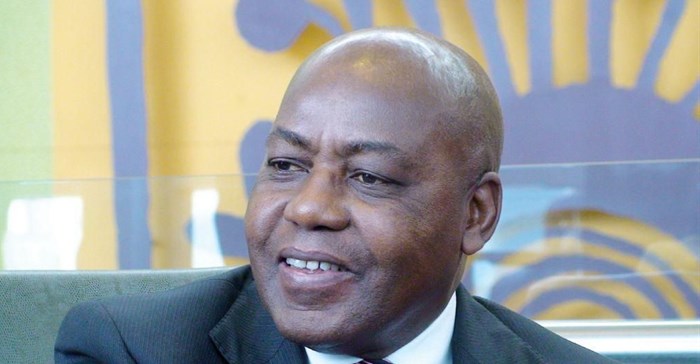
Top stories



LifestyleWhen to stop Googling and call the vet: Expert advice on pet allergies from dotsure.co.za
dotsure.co.za 3 days

AutomotiveHilux Custom Builds offers purpose-built solutions for your business
Toyota South Africa Motors 3 days

The global boom for smartphones and electric cars has pushed up the price of cobalt, a key ingredient in top-range batteries, to $75,000 (almost 63,000 euros) a tonne -- an increase of 127 percent in one year.
DR Congo is the world's leading producer of cobalt, where authorities consider the previous mining code to favour foreign investors at the expense of the economy.
The central African country is also the top African producer of copper, currently trading on the London Metal Exchange at more than $7,000 a tonne for the first time in three and a half years.
Congo's production of copper has rocketed from 27,000 tonnes in 2002 to more than a million tonnes today, according to the preamble to the new mining code.
The code should "make the mines a true motor of the development of the country", according to Minister of Mines Martin Kabwelulu, who has overseen the industry since February 2007.
From the Katanga provinces in the southeast to North and South Kivu on the eastern border via the central Kasai region, the subsoil is rich in gold, diamonds and coltan, another mineral used for electronic products and often cited as an illegal source of finance for conflict.
After many twists and turns, the Congolese government in December presented parliament with its revised version of the 15-year-old mining code, increasingly seen as detrimental to the interests of the state.
"The former code of 2002 was meant to be attractive for investors because then we were in a state of war," Henri Muhiya of the influential Roman Catholic episcopate told AFP, referring to the Second Congo War of 1998-2003.
"We've realised that the investors indeed came, but the profits weren't shared out in a fair way between them and the country," added Muhiya, the secretary of the natural resources commission of the episcopal conference, which has amended the text before parliament.
"We're going to try to find a balance," he said.
The new code, passed by the National Assembly and now in the hands of the Senate, provides for "a broadening of the base and the raising of mining royalties," according to Muhiya.
It sets out taxes of up to five percent on "strategic metals" -- most likely including cobalt -- and six percent on precious stones.
Kinshasa is introducing a form of economic patriotism by raising the stake of the state in the capital of mining companies and outsourcing tasks related to the industry "only to firms in which the majority of the capital is owned by Congolese nationals".
DR Congo authorities also want to ensure the repatriation of at least 40 percent of the revenue of minerals that are sold for export.
Multinational firms have fired back, charging that the new mining code would "significantly weaken the confidence of investors", in a joint letter to the speakers of both houses of parliament.
The protest was signed by the Congolese subsidiaries of giants in the sector, China Molybdenum, Rangold, the Swiss firm Glencore and MMG, an Australian-Chinese venture.
"Our partners have for 15 years -- these words aren't too strong -- cheated and stolen from us. That has to stop," the chief executive officer of the powerful Gecamines state mining firm, Albert Yuma, stormed in November.
The DRC should control its mineral resources like "our Arab brothers have benefitted from the control of oil," said Yuma, leader of the national business community and close to President Joseph Kabila.
Kabila's second and last elected five-year mandate ended on December 20, 2016, but has been extended in a church-brokered deal at the cost of severe repression.
The vast money in mining has to be seen in the context of DR Congo's chronic reputation for corruption and the deep poverty that afflicts most of its 80 million citizens.
Reliable figures for turnover and employment in the mining industry are elusive in a country where much economic activity is unregistered and even the size of the population is unknown, given the absence of a recent census.
Last July the British NGO Global Witness described the mining sector as the regime's "cash machine" and its revenues were being wasted by a "toxic combination of corruption and mismanagement".
In November, US NGO the Carter Center estimated that $750 million generated by mining production between 2011 and 2014 could not be traced in any "reliable fashion" in Gecamines's accounts, an assertion that the company angrily rejects.
Documents released last November in the "Paradise Papers" leak said that Swiss firm Glencore acquired a Congolese mine for a pittance in 2007 through controversial Israeli billionaire Dan Gertler.
In 2013, the NGO Africa Progress Panel analysed five mining sales to offshore companies linked to Gertler's firm.
"Together the five deals cost the DRC at least $1.36 billion, an amount equal to almost twice the DRC's combined annual budget for health and education in 2012," it said.

For more than two decades, I-Net Bridge has been one of South Africa’s preferred electronic providers of innovative solutions, data of the highest calibre, reliable platforms and excellent supporting systems. Our products include workstations, web applications and data feeds packaged with in-depth news and powerful analytical tools empowering clients to make meaningful decisions.
We pride ourselves on our wide variety of in-house skills, encompassing multiple platforms and applications. These skills enable us to not only function as a first class facility, but also design, implement and support all our client needs at a level that confirms I-Net Bridge a leader in its field.
Go to: http://www.inet.co.za